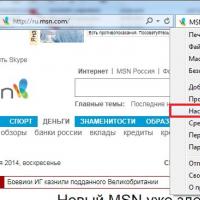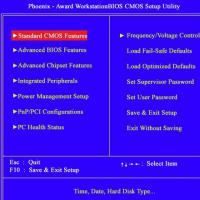Telecommunication systems of Russia. Information and telecommunication network is what? Concept, types and use of information and telecommunication networks 2 Information and telecommunication network
From the point of view of computer science, the computing network as a modulation of an information and telecommunications network is a single complex, which includes a territorially distributed system of computer and their terminals united in unified system Communication with switching equipment, software and protocols for transmission (obtain) information, as well as solutions of information, managerial, computing and / or other tasks (34, 464).
The following features can be distinguished in the reduced definition. computing networkEach of them characterizes one of the important parties to the computer:
- 1) the functional purpose of any computing network is associated with transfer and receipt information;
- 2) the network is computing system (terminals), with which information is processed and prepare it to be transmitted by the user;
- 3) Transferring messages and information (information) is provided switching equipment, software and technological protocols (a set of rules governing the format and information exchange procedures between users).
Gradually, the information, technical, technological and switching properties of the network were evolved into a more compact name and transformed it into the concept of "information and telecommunication network".
The dedicated features and signs were used by the legislator in the formulation of the definition of the concept contained in Art. 2 of the Law "On Information", in accordance with which the information and telecommunications network is defined as a technological system intended for transmission over the communication lines of information, access to which is carried out using computing equipment.
The first sign of the concept under consideration is high-tech property information and telecommunication network. The legislator allocated the technological nature of the network and at the same time stressed that this system consists of elements included in its composition: computing and software, technical channels telephone communication and access subsystem to them (switching equipment).
Consequently, the composition of the information and telecommunications network must include three elements:
- Computing equipment, i.e. computers;
- telephone communication channels;
- System of access to communication channels (switching equipment and their use regulations).
The access system is determined by the relevant conditions (the possibility) of obtaining information or familiarization with it. Such conditions are determined by the mode of access or set of conditions. organizational, legal and technical character. They may include in relation to the specific conditions for the functioning of the information and telecommunications network, various rules and actions aimed at familiarizing, transferring and receiving information, including the use of technical means. Such rules and actions can be directed, on the contrary, to protect information on the network, i.e. Accessing access or receipt of information. In other words, access is always a set of software and hardware, switching equipment, as well as rules and actions (activities), which determine the possibilities of the network user, i.e. A legally established composition that has an important legal value.
The orders of the Ministry of Communications of Russia establishes the rules for the use of means of communication used to provide access to information and telecommunication networks. For example, the Order of the Ministry of Communications Communications of Russia dated December 11, 2006 No. 166 approved the rules for the use of communication tools used to ensure access to information and telecommunication networks, sending email and facsimile messages that contain requirements for communication tools used to provide access to information information -Ellomunication networks, e-mail and fax messaging messages (53).
These rules give the definition of the concept of "means of communication" - technical and softwareincluding any of the listed technical means (TC) or a combination (two or more):
- Email exchange, incl. email, voice call email, short text messages, multimedia messages;
- Information TS in terms of domain names, access to information resources, management;
- remote access;
- authentication and identification;
- Transmission of facsimile messages.
Named communications are subject to mandatory declaration (certification) of compliance with standard requirements. At the same time, the relevant requirements for each of the above-mentioned technical means are established.
The individual regulatory legal acts of the President of the Russian Federation or the Government of the Russian Federation establishes the features of connecting state information systems to information and telecommunication networks.
For example, by the Decree of the Government of the Russian Federation of 05/18/2009 No. 424 "On the features of connecting federal state information systems to information and telecommunication networks" (54) or by decree of the President of the Russian Federation of March 17, 2008 No. 351 "On Measures for Information Security Russian Federation When using information and telecommunication networks of the International Information Exchange "(55).
Information and telecommunications networks can be:
- lAN (in one building of any organization);
- departmental covering users of one department or corporation;
- regional uniting users of cities, regions and other territorial units);
- special purpose (for example, a secure Network of GAS "Justice" and GAS "Elections");
- global (The Internet).
The legislation of the Russian Federation determines the circle of subjects of the information and telecommunications network (participants in legal relations arising from the operation and use of the information and telecommunications network): the owner of the site in the Internet network, the owner of the information resource in the Internet network, the organizer of the dissemination of information in the Internet network , blogger, operator search engine, telecom operator, hosting provider, copyright holder and user. They can be attributed to special subjects in relation to legal relations in the Internet network as species of the information system.
These subjects depending on the functional signs relate to the varieties of three types of informational law entities (owners, information intermediaries and users).
1. Owners as subjects of legal relations arising from the operation and use of the information and telecommunications network. These include the owner of the information, the owner of the information resource, the owner of the site and blogger. All of them are inherent in the general basis - independence In solving questions about creating information, its distribution and restriction of access to information.
For example, the Law "On Information" determines owner of information As "a person who independently created the information either, on the basis of the law or agreement, the right to allow or restrict access to information determined by any signs."
In individual articles of the Law "On Information" (Art. Art. 15.2, 15.3, 15.7, etc.) the owner of the information has another name (owner of the information resource), which does not quite coincide with its content with the concept of "information owner". The composition of the information resource owner of the information resource may not only include information, but also technological (software) means that ensure the functioning of the site (page) in the Internet network, as well as the network address, the domain name, the site pages pointer in the Internet network ( For example, clause 10 of Article 15.5 of the Law "On Information").
To owners relate site owner Defined in the law "On information" as "person, independently and at its discretion, the defining procedure for the use of the site in the Internet network, including the procedure for posting information on such a site." It also emphasizes the sign "At its discretion" - independence in the actions of the site owner on the implementation of its interest, i.e. In determining the procedure for posting information and conditions for restricting access to information.
In accordance with Art. 10.2 of the Law "On Information" to the subjects of the information and telecommunication network include a blogger - the owner of the site and / or page of the site in the Internet network, which hosts publicly available information and access to which within a day is more than three thousand users of the Internet network. . In addition to the sign of independence, including the ability to restrict access to information, blogger is endowed with an additional feature. distributor mass media. a characteristic feature of active actions aimed at obtaining information not just an uncertain circle of persons, but more than three thousand users
internet networks during the day. The named quantitative criterion vividly testifies to the focus of the blogger on the mass audience. Therefore, the characteristic signs of the blogger emphasize its place in the composition of the subjects of informational law as a special subject of disseminating information in the Internet.
On the blogger as a distributor of information on the Internet "Internet" assigned special duties To comply with the legislation of the Russian Federation on prohibitions and restrictions in the information sphere.
In accordance with P.P. 1 and 2 tbsp. 10.2 of the Law "On Information" to them relate to the following duties.
- 1) To not allow Using the site or site page in the Internet network for purposes:
- ? committing criminal acts to disclose the information constituting a state or other secretly protected by law;
- ? distribution of materials containing public calls for the implementation of terrorist activities or publicly justifying terrorism, other extremist materials, as well as materials that promote pornography, the cult of violence and cruelty, and materials containing obscene absenteeism;
- ? Dissemination of information on the privacy of a citizen with violation of civil law.
- 2) Follow:
i prohibitions and restrictions provided for by the legislation of the Russian Federation on referendum and the legislation of the Russian Federation on elections;
- ? the requirements of the legislation of the Russian Federation regulating the procedure for the dissemination of the media;
- ? The rights and legitimate interests of citizens and organizations, including the honor, dignity and business reputation of citizens, a business reputation in organizations.
- 3) Check The accuracy of the posted publicly available information before it is placed and immediately delete posted unreliable information.
In addition, paragraph 2 of the named article when placing information on the site or website page in the Internet network installed:
- 1) use of the site or page of the site in the Internet network in order to conceal or falsify socially significant information, the dissemination of obviously unreliable information under the guise of reliable messages;
- 2) Dissemination of information in order to define a citizen or individual categories of citizens on the basis of gender, age, racial or national affiliation, language, relations to religion, profession, place of residence and work, as well as in connection with their political beliefs.
- 2. Informational intermediaries as subjects of legal relations,
arising from the operation and use of the information and telecommunications network. These include the telecom operator, the hosting provider, the organizer of the dissemination of information on the Internet network, the search engine operator.
In accordance with the Law on Communication Operator - entity or an individual entrepreneur who provide communication services on the basis of the relevant license. The operation of the telecom operator is related to the reception, processing, storage, transmission, delivery of telecommunication messages or mailings. The intermediary role of the telecom operator is to connect subscribers through the transfer and delivery of electronic communication in the information and telecommunications network. The communication operator does not create information and does not dispose of information at the disposal of the site owner. But it provides services for the provision of access to the Internet information and telecommunications network, and in cases provided for by the Law on Information, it is obliged to restrict access to illegally posted information (paragraph 7 of article 15.2) or resume access to the information resource, including the site in the Internet network (and. 6 Article 15.3, etc.).
In accordance with Art. 2 of the Law "On Information" Provider Hosting - a person providing services computing power To post information in an information system that is permanently connected to the Internet. Such services provide organizations that have specialized technical ( server equipment) and technological (software) to place, store, update and use information intended for distribution in the Internet.
The telecom operator and the hosting provider on its main feature (provision of the service) are similar, although their activities have a difference in the content of the functions carried out.
The functions of the hosting provider, in contrast to the functions of the telecom operator, are to provide technological support and accompanying sites (pages) in the Internet. Website owners conclude agreements with them only to implement the right to disseminate information. Such organizations have the technical and technological capacities necessary to ensure round-the-clock functioning of sites (pages) in the Internet network, as well as the sustainable processing of user requests to information posted on such sites. Hosting providers usually create their own data-centers for processing, storage and access to information on the Internet. The functions of the telecom operator and the hosting provider can be combined in one organization in cases where large companies (for example, Rostelecom, MTS, etc.), possess network resources (communication channels) for data transfer and at the same time have powerful data centers.
The hosting provider as well as the communication operator does not create information (information) and does not dispose of it. But it provides services for the provision of opportunities to access the information at the disposal of the site owner (Pages) in the Internet. Just like the telecom operator, in the cases provided for by the law, it is obliged to restrict access to the site in the Internet (paragraph 8 of Art. 15.1), or to information processed with violation of the Russian Federation legislation in the field of personal data ( P.7 Art. 15.5).
In accordance with Art. 10.1 of the Law "On Information" The organizer of the dissemination of information on the Internet "- a person performing activities to ensure the functioning of information systems and (or) programs for electronic computing machines that are intended and (or) are used for receiving, storage, transfer, delivery and delivery and (or) processing email users of the Internet network. This person can be a Russian legal entity, a citizen of the Russian Federation, an individual entrepreneur, a foreign organization and a foreign citizen.
As you can see, the law defines the functions characterizing this subject to disseminate information in the Internet: it is designed to ensure the operation of information systems and programs
EUM intended for receiving, transfer, storage, delivery and / or e-mail processing in the Internet.
Here, the organizing role is reduced not only to ensure the sustainable work of the network technological system and the battery processing and broadcasting (transmission) of electronic messages of the Internet network, but also the storage of voice information, written text, images, sounds, information about these users and providing it authorized state bodies carrying out operational and search activities (Horde) or ensuring the security of the Russian Federation.
From here, the specific functions of the organizer of the dissemination of information on the Internet network for the storage of information received and transmitted and information about users of such information, as well as providing its authorized state bodies carrying out Hordes or ensuring the safety of the Russian Federation.
In accordance with P.P. 2,3,4 art. 10.1 of the Law "On Information" To implement these functions, the organizer of information dissemination in the Internet network is endowed with the responsibilities:
notify The federal executive body, which performs functions to control and oversight in the field of media, mass communications, information technologies and communication (Roskomnadzor), on the start of their activities;
keep On the territory of the Russian Federation, information on the facts of reception, transmission, delivery and (or) processing of voice information, written text, images, sounds or other emails of the Internet users and information about these users within six months from the date of the implementation of such actions;
give Specified information by authorized state bodies carrying out Horde or security of the Russian Federation in cases established by federal laws;
provide implement established by Roskomnadzor in coordination with authorized government agencies carrying out Horde or ensuring the safety of the Russian Federation, the requirements for equipment and software and technical means used by the indicated organizer in the information systems operated by them, for these bodies in cases established by federal laws, activities in order to implement the assigned on them tasks;
take measures To prevent the disclosure of organizational and tactical techniques for events, organized by the Organizations or ensuring the safety of the Russian Federation.
Decree of the Government of the Russian Federation of 31.07.2014 No. 759 defines the rules for storing information on the facts of reception, transmission, delivery and (or) processing of voice information, written text, images, sounds or other emails of the Internet users and information about these users, providing It is authorized bodies (authorized state authorities carrying out Horde or security of the Russian Federation).
In accordance with paragraph 12 of the named Resolution of the Government of the Russian Federation, the organizer of the dissemination of information on the Internet network provides storage and provision of voice information, written text, images, sounds or other emails of users of the Internet network authorized authorities in relation to:
- ? registered using network addresses as used on the territory of the Russian Federation;
- ? authorized using network addresses as used in the Russian Federation;
- ? specifying when registering a document certifying the person issued by the state authority of the Russian Federation (the main document or other document certifying the identity);
- ? use to access communication internet service devices and / or computer programs that transmit geographic data (metadata) communications Internet service indicating (including temporary) user on the territory of the Russian Federation;
- ? indicating when registering as contact information phone numbersallocated by Russian telecom operators when concluding a communication service agreement with the subscriber. one
Currently, the distribution in the Internet "Internet" received search engines - information systems that are in request of the user search on the Internet "Internet" information of certain content and providing the user information about the site page index in the Internet network to access the requested information located on sites in the Internet network owned by other persons (Art. 2 of the Law "On Information").
The information "On Information" does not relate to them information systems used to implement state and municipal functions, providing state and municipal services, as well as to implement other public authority established by federal laws.
There are various search engines in the Internet "Internet". The most popular search engines are global in nature: Googl, Yandex, Rambler, Yahoo!, MNS and others. The operation of such systems provides search system operator
Search for information on the Internet network in such systems is carried out at the request of the user using the pointer keywordswhich are usually entered into a special dialog box. At the same time, the search engine with the help of embedded semantic elements is retrieved from suitable information resources (databases and directories) and generates many pages with addresses pointers most adequate in meaning and relevant (relevant) request. As a rule, the first pages of such addresses are formed to the greatest degree of relevant request.
Most search engines are created with an advertising goal to attract consumer attention from the Internet user network to advertised products (goods and services).
Therefore, in accordance with Art. 10.3 of the Law "On Information" The operator of the search engine, distributing on the Internet "Internet" advertising, which is aimed at attracting consumer attention on the territory of the Russian Federation, is obliged at the request of a citizen (applicant) to stop issuing information about the site page index in the Internet network (link), allowing access to information:
- ? about the applicant disseminated in violation of the legislation of the Russian Federation, which is inaccurate;
- ? irrelevant, which has lost importance for the applicant due to subsequent events or actions of the applicant, with the exception of information on events containing signs of criminal acts, the timing of attraction to criminal responsibility for which they did not exist;
- ? On the commission of a citizen of a crime, according to which the conviction is not removed or repulsed.
Within ten working days from the date of receipt of the applicant's claim, the search engine operator is obliged to terminate the issuance of references to the information specified in the applicant's request containing the applicant's name and (or) name of the applicant, notify the applicant about this or send a motivated refusal to the applicant.
The applicant, who considers the refusal of the search engine operator unfounded, has the right to apply to the court with a claim to terminate the issuance of references to the information specified in the applicant's demand.
The search engine operator must not disclose information
- 0 The fact of the applicant's appeal to a requirement, except in cases established by federal laws.
- 3. Users as subjects of legal relations arising from the operation and use of the information and telecommunications network do not have special specific status features.
All user networks are similar to this type of subjects functional consumer Signs of the user different species Information or recipient of information services. Moreover, the species functions and interests of the user (recipient) do not have a decisive value. The chief distinctive feature reflects information Need (interest) of a person, therefore, this feature plays a major role among all other species functional signs. Users are subjects of informational law that satisfy their information needs by finding and receiving information, receiving communication services, receiving a public (state or municipal) service in electronic form, etc.
For users, for example, applying applicants of public services received by the Internet - individuals or legal entities or their authorized representatives who addressed to the authority providing public services, or to a body that provides municipal services or other organizations (for example, in MFC) with a request for the provision of state or municipal services, expressed in oral, written or electronic form.
In accordance with Art. 1 of the Law "On Access to Official Information" User with information - "Citizen ( individual), organization (legal entity), public association, which search for information on the activities of state bodies and local governments. Users of information are also state bodies, local governments that search for this information in accordance with this Federal Law "
In accordance with Art. 2 of the Law "On Communication" "Subscriber - a communication service with which a contract for providing such services has been concluded when allocating subscriber number or a unique identification code for these purposes."
- Decree of the Government of the Russian Federation of 07/31/2014 No. 746 "On approval by the organizers of the Dissemination of Information in the Information and Telecommunication Network" Internet "of the Federal Service for Supervision of Communications, Information Technologies and Mass Communications on the Beginning of Exercise to ensure the functioning of information systems and (or) programs For electronic computing machines, intended and (or) used for reception, transmission, delivery and / or (or) processing of electronic messages users of the information and telecommunications network "Internet", as well as maintaining the register of these organizers. "// SZ RF. 2014. No. 32. Art. 4519.
- SZ RF. 2009. No. 7 of Art. 776.
- SZ RF. 2003. No. 28. Art. 2895.
From the point of view of informatics, the computing network as a mode of an information and telecommunications network is a single complex, which includes a territorially distributed system of the computer and their terminals, combined into a unified system of communication with the use of switching equipment, software and protocols for transmission (receipt) information, and solutions for information, managerial, computational and / or other tasks (21, 464).
The following features of the computer network can be distinguished in the definition.
1. Functional purpose of any computing network is associated with transfer and receipt Information.
2. The network is computing system (Terminals) with which information is processed and prepare it to be transmitted to the user.
3. Exchange messages and information (information) is ensured switching equipment, software and technological protocols (a set of rules governing the format and information exchange procedures between users).
Each of the selected features characterizes one of the important parties to the computer network.
Gradually, the information, technical, technological and switching properties of the network evolved into a more compact name and transformed it into the concept of "information and telecommunication network".
The dedicated features and signs were used by the legislator in the formulation of the definition of the concept contained in Article 2 of the Law "On Information", in accordance with which information and Telecommunication Networka kind of technological system is defined, intended for transmission over the communication lines of information, access to which is carried out using computing equipment.
The first sign of the concept under consideration is high-tech property information and telecommunication network. The legislator allocated the technological nature of the network and at the same time stressed that this system consists of elements included in its composition: computing and software, telephone technical channels and access subsystems (switching equipment).
Consequently, the composition of the information and telecommunications network must include three elements:
· Computing equipment, i.e. computers;
· Telephone communication channels;
· System of access to communication channels (switching equipment and regulations of their use).
The access system is determined by the relevant conditions (the possibility) of obtaining information or familiarization with it. Such conditions are determined by the mode of access or set of conditions. organizational, legal and technicalcharacter. They may include in relation to specific conditions for the functioning of the information and telecommunications network, various rules and actions aimed at familiarizing, transferring and receiving information, inclible, incl. Actions to use technical means. Such rules and actions can be directed, on the contrary, to protect information on the network, i.e. Accessing access or receipt of information. In other words, access is always a set of software and hardware, switching equipment, as well as rules and actions (activities), which determine the possibilities of the network user, i.e. A legally established composition that has an important legal value.
Orders of the Ministry of Information Technologies and Communications of the Russian Federation establishes the rules for the use of communication tools used to provide access to information and telecommunication networks.
For example, by order of the Ministry of Information Technology and Communications of the Russian Federation of December 11, 2006 No. 166 approved the rules for the use of communication tools used to ensure access to information and telecommunication networks, sending email and fax messages that contain requirements for communications used To provide access to information and telecommunication network information, email and fax messages (215).
These rules give the definition of concept "means of communication" - Technical and software, including any of the listed technical means (TC) or their combination (two or more):
1. TC exchange email messages, incl. email, voice email transmission email, short text messages, multimedia messages;
2. Information TS in terms of domain names, access to information resources, management;
3. TC remote access;
4. TC authentication and identification;
5. TC transfer fax messages.
Named communications are subject to mandatory declaration (certification) of compliance with standard requirements. At the same time, the relevant requirements for each of the above-mentioned technical means are established.
The individual regulatory legal acts of the President of the Russian Federation or the Government of the Russian Federation establishes the features of the connection of state information systems to information and telecommunication networks.
For example, by the Decree of the Government of the Russian Federation of May 18, 2009 No. 424 "On the peculiarities of connecting federal state information systems to information and telecommunication networks" (216) or by decree of the President of the Russian Federation of March 17, 2008 No. 351 "On measures to ensure the information security of the Russian Federation when using information and telecommunication networks of international information exchange "(217).
Information and telecommunications networks can be:
lAN (one organization's building);
departmentalcovering users of one department or corporation;
regionaluniting users of cities, regions and other territorial units);
special purpose (for example, a protected network of the State Automated GAS system "Justice", the State Automated System of GAS "Elections", etc.);
global (The Internet).
Questions for control:
1. Structure of the information system
2.Name and types of information and telecommunication network
3. Access to information and telecommunication network
The study of the legal essence of the Internet, the legal culture of the personality and their interaction is the necessary prerequisite for the analysis of the peculiarities of the formation of the legal culture of the individual in the conditions of the formation of the information society.
Internet as a global information space "does not recognize" state borders and is not only efficient tool Access to information resources accumulated by humanity, but also becomes a means of disseminating the media. The network functioning is a powerful factor in the development and use of advanced technologies. On the other hand, using the Internet associated: the possibility of uncontrolled dissemination of harmful information, penetration into the management system, human rights violations, which, undoubtedly, requires special attention to issues information protection. The rapid development of the Internet in the civilized world is ahead of the process of creating and improving the regulatory legal acts necessary to regulate emerging problems. With the development of the Internet in recent years, the legal problems of the network are becoming increasingly relevant on the background of a noticeable transformation in the world of approaches to their settlement: from the emphasis on self-regulation - to severe legal regulations. In our country, at the end of 1996, a parliamentary hearings held by the Committees of the State Duma on Safety and Information Policy and Communications and Communications and Communications were held at the end of 1996 as a response to the general attention of the general public. The main problems requiring a legislative settlement in Russia in connection with the development of the Internet are practically no different from those in other developed countries of the world: 1) providing free Internet connection and network exchange; 2) legal protection of copyright and other objects of intellectual property; 3) Protection of personal data, in particular those data that are collected in the process of network operators (including addresses, telephones and other personal data of subscribers or buyers in the e-commerce system); 4) connecting state bodies to the Internet and providing citizens with information on the activities of these bodies; 5) preventing the dissemination of offensive and indecent information, calls for inciting national, racial, religious retail, etc.; 6) electronic documentarms electronic signature, confirmation of the authenticity of information in information products, viewing and information transfer tools; 7) e-commerce; eight) information Security: computer viruses, unauthorized access to information, breaking servers and networks, destruction and substitution of information; 9) the use of cryptographic funds; 10) Jurisdiction: Legislation of which state must be applied to resolve the actions performed on the network. An analysis of the current Russian legislation shows that the issues of legal regulation associated with the functioning and development of the Internet system in Russia form an extensive regulatory framework, which includes only the federal level of more than 50 federal laws, not to mention the numerous regulatory legal acts of the President and the Government of the Russian Federation. The spectrum of these legislative acts is extremely wide, and their interpretation from the standpoint of the specifics of legal relations arising from the use of modern information technologies is difficult, especially since the development of these laws did not provide for the relevant opportunities. It is clear that for ships this area Legal relations are completely new.
The Internet, being a network for information transfer, is the habitat of the information society, organically fucked with general trends in the informatization of various sides of public life. Most of the definitions of information have something in common. In particular, they suggest the existence of at least four components:
Klimenko S., Uzhezmetov V. Internet: the habitat of the information society. Protvino, 1995. P. 17 - 22.
1) the process of knowing something, which information is transmitted;
2) transmitting information;
3) perceiving information;
4) the information itself.
Based on the above information transmitted via the Internet, it is information about the world around the world, its objects, processes and phenomena, presented in the form that allows you to decipher the encoded data (data is in binary form and do not need to be converted, as, for example, Scanning an image either when digitized sound).
Petrovsky S.V. Legal regulation of Internet services: dis. ... Cand. jurid science M., 2002. P. 24.
Thus, the Internet as an information and telecommunication network is a means of transmitting information about the world around the world, its objects, processes and phenomena, objectified in the form that allows them to carry out their machine processing (decoding).
Internet from a technical point of view is the largest telecommunications network formed by combining more than ten thousand five hundred telecommunication networks different types. Such an association was made possible by using the TCP / IP Firewall Protocol, which plays the role of a kind of standards translator when transferring data between multi-way telecommunications networks.
In accordance with paragraph 3 and 4 of Art. 2 of the Law on Information information system - a set of information contained in the databases and providing its processing of information technologies and technical means; Information and Telecommunication Network - a technological system designed for transmission lines of information, access to which is carried out using computing equipment.
On the territory of the Russian Federation, the use of information and telecommunication networks is carried out in compliance with the requirements of the legislation of the Russian Federation in the field of communication, this Federal Law and other regulatory legal acts of the Russian Federation.
Regulation of the use of information and telecommunication networks, access to which is not limited to a certain circle of individuals, is carried out in the Russian Federation, taking into account the generally accepted international Practice Activities of self-regulatory organizations in this area. The procedure for using other information and telecommunication networks is determined by the owners of such networks, taking into account the requirements established by this Federal Law.
Recipient e-mailOn the territory of the Russian Federation, it is entitled to check whether to establish the sender of an electronic message, and in cases established by federal laws or agreement of the parties, cases are obliged to conduct such an inspection.
Transferring information through the use of information and telecommunication networks is carried out without restrictions, subject to compliance with the requirements established by federal laws to disseminate information and the protection of intellectual property. The transfer of information may be limited only in order and on the conditions that are established by federal laws.
In the process of legal regulation of the Internet there are new items of relationships:
- site - a set of web pages with a repeated design, combined with thematically related references navigation and physically located on a web server local network or the Internet at one address (domain name);
- Web page - an electronic document made based on the HTML hypertext markup language (HYPERTEXT MARKUP LANGUAGE) and incoming as an information representation unit to a set of pages with mutual hyperlinks - website on a local network or the Internet;
- Domain - Each computer connected to the Internet is highlighted unique an identification number, called the IP address. IP means Internet Protocol, i.e. The protocol by which computers interact on the Internet takes place. The IP address is a sequence of four numbers, separated by points, and looks like this: 82.116.44.1. The IP address presented in this form is complicated to memorize by man. In this regard, a domain name system was created for ease of memorization and perception (DNS). With this system, it was possible to compare each IP address a unique symbolic name called domain name;
— email - Telecommunication type, carried out by Internet technologies.
 Causes of why Flash Player does not work, and troubleshooting
Causes of why Flash Player does not work, and troubleshooting The laptop itself turns off, what to do?
The laptop itself turns off, what to do? HP Pavilion DV6: Characteristics and Reviews
HP Pavilion DV6: Characteristics and Reviews Format representation of a floating point numbers How negative numbers are stored in the computer's memory
Format representation of a floating point numbers How negative numbers are stored in the computer's memory Computer fries and does not turn on what to do?
Computer fries and does not turn on what to do? Why does not work mouse on a laptop or mouse?
Why does not work mouse on a laptop or mouse? How to increase or decrease the scale of the page (font) in classmates?
How to increase or decrease the scale of the page (font) in classmates?